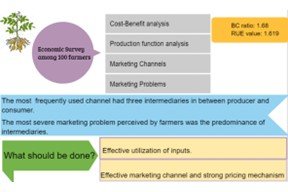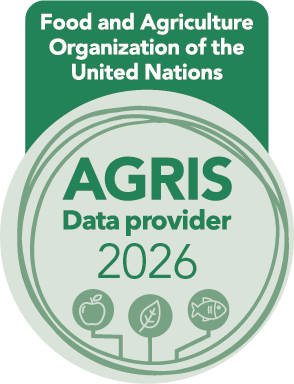Analysis of economic, production, and marketing aspects of potato farming in Changunarayan Municipality of Bhaktapur, Nepal
DOI:
https://doi.org/10.26832/24566632.2023.0804013Keywords:
Cobbs Douglas Model, Benefit-cost ratio, Production function, Resource use efficiencyAbstract
A comprehensive study was undertaken in the Changunarayan Municipality of Bhaktapur District to conduct a thorough cost-benefit analysis, analyze production functions, and evaluate the various marketing channels and associated challenges of potato cultivation. A total of 100 farmers were surveyed, and gathered data were, analyzed using Excel and SPSS software. Despite an average cost per hectare of potato cultivation reaching NRs 370,662.58, which is comparatively higher than in other regions, the productivity was notably greater at 22.021 Mt/ha, surpassing the national average of 16.73 Mt/ha. With a benefit-cost ratio of 1.68, potato production was found economically viable in the region. The production function analysis, conducted using the Cobb-Douglas Model, revealed noteworthy insights among the six variables examined. Fertilizers, machinery, plant protection measures, and micronutrients were identified as underutilized inputs, as indicated by a RUE value surpassing unity. Conversely, labor cost and various other factors exhibited negative associations with average returns. The study also revealed that potato production in the area exhibited an increasing Return to Scale (RTS) value of 1.619, indicating that a 1% increase in input expenditure would lead to a 1.619% increase in returns. Farmers primarily choose a marketing channel with three intermediaries, which results in a larger market margin but a smaller share for the producers. Among the five key marketing challenges reported by farmers, the influence of intermediaries stands out as the most significant issue. In conclusion, this study highlights the pressing need for efficient marketing channels and fair pricing systems to support potato farmers in the region.
Downloads
References
AITC. (2023). Agriculture and livestock diary 2079(2021/2022). Government of Nepal, Agriculture and Livestock development Ministry, Agriculture Information and Training Center, Lalitpur, Nepal.
Bajracharya, M., & Sapkota, M. (2017). Profitability and productivity of potato (Solanum tuberosum) in Baglung district, Nepal. Agriculture and Food Security, 6(1), 1–8, https://doi.org/10.1186/S40066-017-0125-5/TABLES/8
Dahal, B., & Rijal, S. (2019). Production economics and determinants of potato production in Nuwakot, Nepal. International Journal of Applied Sciences and Biotechnology, 7(1), 62–68, https://doi.org/10.3126/ijasbt.v7i1.23304
FOASTAT. (2022). Food and Agriculture Organization of the United Nations: Statistical Database, Italy, Rome. Retrieved from: https://www.fao.org/faostat/en/#country
Gairhe, S., Gauchan, D., & Timsina, K. (2017). Adoption of Improved Potato Varieties in Nepal. Journal of Nepal Agricultural Research Council, 3, 38–44, https://doi.org/10.3126/JNARC.V3I1.17274
Gautam, D., Dhakal, S. C., Kattel, R. R., & Khanal, N. P. (2022). Resource Use Efficiency (RUE) in Lentil Production in Terai and Inner Terai Regions of Nepal. Journal of Nepal Agricultural Research Council, 8, 72–87, https://doi.org/10.3126/jnarc.v8i.44865
Giang, P. Q., & Huong, V. T. T. (2023). Comparison of the Impact of Production Factors on the Ecological and Economic Efficiency of the Potato Land-Use Type in Vietnam and Russia Based on the Cobb-Douglas Production Function. Journal of Ecological Engineering, 24(9), 272–281, https://doi.org/10.12911/22998993/169181
Grommers, H. E., & Van der Krogt, D. A. (2009). Potato Starch: Production, Modifications and Uses. Starch, 511–539, https://doi.org/10.1016/B978-0-12-746275-2.00011-2
Haverkort, A. J., & Struik, P. C. (2015). Yield levels of potato crops: Recent achievements and future prospects. Field Crops Research, 182, 76–85, https://doi.org/10.1016/J.FCR.2015.06.002
Joshi, D., Banjade, D., Datt, B., Chauhan, B., Joshi, D., Chand, &, Chauhan, B., Datt Bhatta, B., Awasthi, P., Paneru, M., Shrestha, M., & Chand, P. B. (2022). Economic of potato (Solanum tuberosum L.) production and marketing in the Darchula district of Nepal. Archives of Agriculture and Environmental Science, 7(3), 393–401, https://doi.org/10.26832/24566632.2022.0703013
Kharel, M., Nath Ghimire, Y., Prasad Timsina, K., Prasad Adhikari, S., Subedi, S., & Kumari Poudel, H. (2021). Economics of production and marketing of wheat in Rupandehi district of Nepal. Journal of Agriculture and Natural Resources, 4(2), 2661–6289, https://doi.org/10.3126/janr.v4i2.33844
Kirkman, M. A. (2007). Global Markets for Processed Potato Products. Potato Biology and Biotechnology: Advances and Perspectives, 27–44, https://doi.org/10.1016/B978-044451018-1/50044-0
Mahaboob, B., Ajmath, K. A., Venkateswarlu, B., Narayana, C., & Praveen, J. P. (2019). On Cobb-Douglas production function model. AIP Conference Proceedings, 2177(1), https://doi.org/10.1063/1.5135215/1018417
MoALD. (2023). Statistical Information on Nepalese Agriculture 2077/2078 (2020/21). Government of Nepal, Ministry of Agriculture and Livestock Development, Planning and Development Cooperation Coordination Division, Statistics and Analysis Section, Kathmandu, Nepal.
Nandwani, D., Jamarkattel, D., Dahal, K. R., Poudel, R., Giri, S., & Joshi, T. N. (2021). Attitudes of Fruit and Vegetable Farmers towards Organic Farming in Kathmandu Valley, Nepal. Sustainability, 13(7), 3888. https://doi.org/10.3390/SU13073888
Pandey, A., Bista, D. R., Bhandari, T., Panta, H. K., & Devkota, S. (2020). Profitability and resource-use efficiency of sugarcane production in Nawalparasi West district, Nepal. Cogent Food & Agriculture, 6(1). https://doi.org/10.1080/23311932.2020.1857592
PIU. (2022). Annual Progress Report and Data Booklet 2077/78. Project Implementation Unit (Bhaktapur), PMAMP, Nepal.
Rai, M. K., Paudel, B., Zhang, Y., Khanal, N. R., Nepal, P., & Koirala, H. L. (2019). Vegetable Farming and Farmers’ Livelihood: Insights from Kathmandu Valley, Nepal. Sustainability, 11(3), 889. https://doi.org/10.3390/SU11030889
Sapkota, M., & Bajracharya, M. (2018). Resource use efficiency analysis for potato production in Nepal. Journal of Nepal Agricultural Research Council, 4, 54–59. https://doi.org/10.3126/jnarc.v4i1.19690
Shively, G., & Galopin, M. (2013). An overview of benefit-cost analysis. Retrieved from: http://www. agecon. purdue. edu/staff/shively/COURSES/AGEC406/reviews/bca. htm.
Shrestha, S., Shrestha, R., Paudel, A., Paudel, A., Gurung, B., & Poudel, U. (2022). Value Chain Analysis of Potato in Tokha Municipality of Kathmandu District, Nepal. Economic Growth and Environment Sustainability, 1(1), 19–31,https://doi.org/10.26480/egnes.01.2022.19.31
Singh, B., Raigond, P., Dutt, S., & Kumar, M. (2020). Potatoes for Food and Nutritional Security. Potato: Nutrition and Food Security, 1–12,https://doi.org/10.1007/978-981-15-7662-1_1
Singh, B., Raigond, P., Dutt, S., Lal, M. K., Jaiswal, A., Changan, S. S., & Koundal, B. (2023). Nutrition in Potato and Its Food Products. Vegetables for Nutrition and Entrepreneurship, 179–201, https://doi.org/10.1007/978-981-19-9016-8_9
Subedi, S., Ghimire, Y. N., Gautam, S., Poudel, H. K., & Shrestha, J. (2019). Economics of potato (Solanum tuberosum L.) production in the terai region of Nepal. Archives of Agriculture and Environmental Science, 4(1), 57–62, https://doi.org/10.26832/24566632.2019.040109
The wall street journal. (2015). Pushing the potato: China wants people to eat more ‘Earth Beans.’
Timsina, K., Kafle, K., & Sapkota, S. (2011). Economics of potato (Solanum tuberosum L) production in Taplejung district of Nepal. Agronomy Journal of Nepal, 2, 173–181.
Wilts, H., Schinkel, J., & Koop, C. (2020). Effectiveness and efficiency of food-waste prevention policies, circular economy, and food industry. Food Industry Wastes: Assessment and Recuperation of Commodities, 19–35, https://doi.org/10.1016/B978-0-12-817121-9.00002-4
Yang, Y., Yang, L., & Liu, S. Y. (2020). Analysis of agricultural economic growth factors based on Cobb Douglas production. E3S Web of Conferences, 189, 01002, https://doi.org/10.1051/E3SCONF/202018901002

Downloads
Published
How to Cite
Issue
Section
License
Copyright (c) 2023 Agriculture and Environmental Science Academy

This work is licensed under a Creative Commons Attribution-NonCommercial 4.0 International License.




